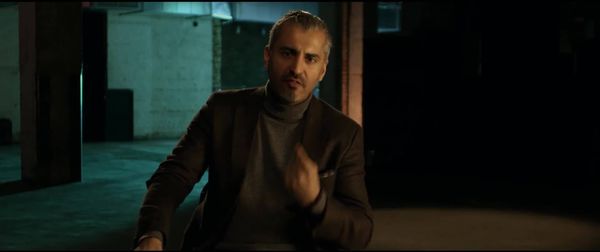Eye For Film >> Movies >> Islam And The Future Of Tolerance (2018) Film Review
Islam And The Future Of Tolerance
Reviewed by: Jennie Kermode

In today's media climate, which sees major cultural issues 'debated' in 30 second soundbites in heavily edited programmes designed to be provocative, how do two people with very different perspectives come together to engage in constructive dialogue? Disillusion by a small screen encounter which made them feel hopelessly polarised, outspoken atheist Sam Harris and former Islamist Maajid Nawaz, now a moderate Muslim, get together in this documentary to try and make some progress - and, in the progress, discover that they have more in common than they thought.
This crowdfunded documentary begins with the implicit assumption that most of its viewers will be atheists or, at any rate, members of a secular society, so the film focuses primarily on having Nawaz explain his thinking, with Harris not required to do the same work. If this seems unfair, it's worth noting the Nawaz doesn't see it that way. He clearly welcomes the opportunity to explain in detail some of the things he doesn't get to talk about on TV, and to reach out in the hopes of reducing Islamophobic hostility. He does so by discussing some of the most ethically divisive Islamic texts directly and without apologism.
Central to this is Nawaz's own journey, which is discussed in brief snippets that form the backdrop to his philosophical monologues. His journey from a youth in which he didn't really think about religion, through impassioned Islamism and on to a reawakening as a moderate means he feels well placed to compare and contrast different takes on Islam and, indeed, to embody the contradictions inherent in the popular assumption that all members of any one religious group believe the same thing. He discusses issues around literalism and the different weight given to Qur'an and Hadith. Meanwhile, we learn about the transformative effect that time spent in prison had on him - not radicalising him but forcing him into contact with people he had considered incorrigible sinners, to the point that he began to identify them as fellow human beings.
Surrounding these narratives are Harris' shorter comments, just as telling in their way. Initially sceptical of the notion that a committed Muslim can believe in peace and support the rights of others, Harris gradually mellows. His general dislike of religion also seems to soften as he realises that he and Nawaz are not really very far apart in their underlying moral principles.
This celebration of moderation and nuance lets itself down a little at the end by taking a purist position on free speech, ignoring the many complications thereof in a manner quite at odds with its earlier approach. It's a particularly curious line in light of Nawaz's earlier ruminations on racism and the experiences of bullying that he believes contributed to his youthful radicalisation. Nevertheless, in a society that's always demanding that minorities do the hard work of explaining themselves, only to deny them the chance to do so, this is a bold attempt to do things differently. After all, all the free speech in the world will get one nowhere until people decide to listen.
Reviewed on: 06 Dec 2018














